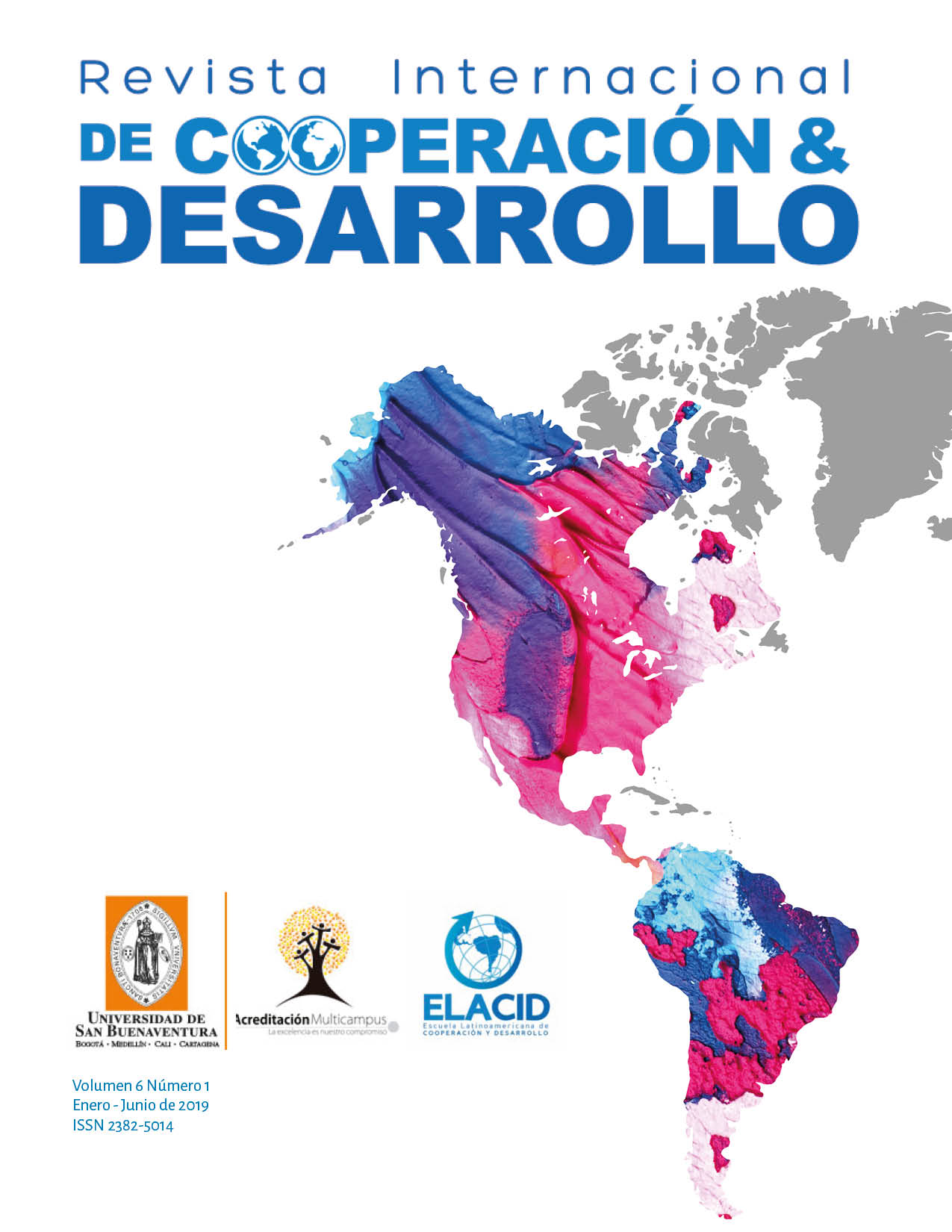INTERNATIONAL JOURNAL OF COOPERATION AND DEVELOPMENT
Assignment of Rights
Authorization for reproduction, publication, communication and distribution of a literary, artistic or scientific
Work.
I , ____________________________________________, author of the book and / or article , of legal age , resident of the city of _________________ , identified with citizenship / passport n° ______________________ issued on _______________________, in exercise of his physical and mental faculties , part henceforth be called the AUTHOR , supports the following authorization to the reproduction, publication, communication and distribution of a work, perform the following terms:
1. Regardless of current legal regulations due to the linking of the parties to this contract, and any kind of legal presumption , the parties agree that the AUTHOR authorize ( name of the publisher ) to reproduce , publish , communicate and distribute the material referred to in the International Journal of Cooperation and Development of the University of San Buenaventura.
2. Such authorization lies in particular on the copyright of the work, by any means known or unknown, publication of the work, distribution of the work , either directly or through third parties for purely educational purposes.
3. AUTHOR agrees to report and declare the existence of this authorization and to preserve the right of the International Journal of Cooperation and Development of the first publication of the work.
4. AUTHOR declares that the article is original and that it is his sole creation, no impediment of any kind exist for the authorization he is doing, besides being responsible for any action claim, plagiarism or other type of claim that might arise about .
5. Such permission is free of charge.
6. Moral copyright in the article are solely the AUTHOR and the University of San Buenaventura expressly agrees to recognize and respect them rigorously.
The Author and / or AUTHORS
SIGNATURE
Abstract
The article presents the main findings of an investigation carried out by the Mora Institute, at the invitation of the World Bank Institute, entitled “The exchange of knowledge: A review of institutional and operational practice in Brazil, China, Indonesia, Mexico, Singapore and South Africa”, Whose objective was to analyze the exchange of knowledge as a fundamental strategy in international cooperation relations, and particularly in South-South cooperation (CSS).
This research was carried out simultaneously in the five countries mentioned and one of the essential questions was how to promote the institutionalization of knowledge exchange in the instances that in each country carry out international cooperation actions. Thus, in the case of Mexico, the institutions analyzed were the Ministry of Environment and Natural Resources, Semarnat, the Ministry of Social Development, Sedesol and the Mexican Agency for International Development Cooperation, Amexcid. Among the fundamental findings, it was identified that, although the exchange of knowledge is not conceptualized as such in the institutional discourse, it is carried out permanently in the concrete actions of international cooperation. Therefore, its full internalization is required to move towards a knowledge-based culture and society in order to more clearly dimension its value and the benefits of its use and application towards the search for solutions to national and regional needs and problems and worldwide.
Keywords: International Cooperation; South-South Cooperation; Knowledge Management and Exchange; Emerging Countries.
References
Comisión Económica para América Latina y El Caribe - CEPAL. (2018). Panorama Social de América Latina. Recuperado de https://repositorio.cepal.org/bitstream/handle/11362/44395/11/S1900051_es.pdf
Grupo Banco Mundial. (2019). Recuperado de http://www.bancomundial.org/
Parra, A., y Leylavergne, J. (2009). La cooperación: ¿un instrumento de refuerzo del soft power? Recuperado de http://www.researchgate.net/publication/44130778_La_cooperacin_un_instrumento_de_refuerzo_del_soft_power
Mundo Marino. (2019). China afianza la cooperación con América Latina con la iniciativa de la Franja y la Ruta. Recuperado de https://www.mundomaritimo.cl/noticias/china-afianza-la-cooperacion-con-america-latina-con-la-iniciativa-de-la-franja-y-la-ruta
Organización de las Naciones Unidas - ONU. (2015). Transformar nuestro mundo: la Agenda 2030 para el Desarrollo Sostenible. Recuperado de https://unctad.org/meetings/es/SessionalDocuments/ares70d1_es.pdf
Open Forum for CSO Development Effectiveness. (2010). Principios de Estambul para el trabajo de las OSC como actoras del desarrollo. Recuperado de http://www.civilisac.org/web/wp-content/uploads/principios-de-estambul-para-el-trabajo-de-las-osc-como-actoras-del-desarrollo.pdf
OXFAM Intermón. (2019). Cooperación triangular. Recuperado de http://www.realidadayuda.org/glossary/cooperacion-triangular
Pautassi, L. (2010). Indicadores en materia de derechos económicos, sociales y culturales. Más allá de la medición. En V. Abramovich, y L. Pautassi, (Comps.), La medición de Derechos en las Políticas Sociales (pp. 1-82), Buenos Aires, Argentina: Editores del Puerto
Peluffo, M., y Catalán, E. (2002). Introducción a la gestión del conocimiento y su aplicación al sector público. Recuperado de https://repositorio.cepal.org/bitstream/handle/11362/5586/1/S2002617_es.pdf
Plataforma de Gestión del Conocimiento – PESA. (2017). Proyecto de Seguridad Alimentaria para Zonas Rurales Recuperado de https://sites.google.com/view/plataformagcpesamexico/p%C3%A1gina-principal
Programa de las Naciones Unidas para el Desarrollo – PNUD. (2014). Marco Estratégico de Gestión del conocimiento del PNUD 2014 -2017. Recuperado de https://www.undp.org/content/dam/undp/library/development-impact/UNDP_Knowledge-Strategy_SP_Web.pdf.
Sanahuja, J. (2011). Entre los Objetivos de Desarrollo del Milenio y la Cooperación Sur-Sur. Pensamiento Iberoamericano, (8), 195-222. Recuperado de https://eprints.ucm.es/42573/1/entre%20los%20objetivos%20de%20desarrollo%20del%20milenio%20y%20la%20cooperacion%20sur%20sur.pdf
Sánchez, G., y Romero, S. (2012). Opciones para la Institucionalización del Intercambio de Conocimiento como estrategia de Cooperación Internacional. México D.F, México: Instituto de Banco Mundial.
Sánchez, G., Ponce, E., Gómez, B., Romero, S., Lucatello, S., y Sosa, J. (2014). Cooperación internacional en ciencia, tecnología e innovación: lineamientos para una política mexicana, México D.F, México: Instituto Mora.
Secretaría General Iberoamericana – SEGIB. (2017). Informe de la Cooperación Sur-Sur en Iberoamérica 2017. Recuperado de https://www.segib.org/?document=informe-de-cooperacion-sur-sur-en-iberoamerica-2017
Sistema Económico Latinoamericano y del Caribe – SELA. (s.f.). ¿Qué es la Cooperación Sur-Sur? Recuperado de http://sursur.sela.org/qué-es-la-css/conceptos-de-la-cooperación-sur-sur/
Sociedad del Conocimiento. (2015). ¿Qué es la sociedad del conocimiento? Recuperado de http://sociedaddelconocimiento.com
Tezanos, S., y Quiñones, A. (2012). ¿Países de renta media? Una taxonomía alternativa del desarrollo de América Latina y el Caribe. Revista iberoamericana de Estudios de Desarrollo, 1(2), 5-7. Recuperado de https://www.academia.edu/2106789/_Pa%C3%ADses_de_renta_media_Una_taxonom%C3%ADa_alternativa_del_desarrollo_de_América_Latina_y_el_Caribe
The World Bank., y Fondo para el Medio Ambiente Mundial. (s.f.). Taller: El arte del intercambio de conocimiento. Recuperado de http://www.thegef.org/sites/default/files/events/AoKE%20Presentation_SP_0.pdf
Schulz, N. (2011). G20 pillar on Knowledge Sharing – Updates. Recuperado de http://www.southsouth.info/G20
The World Bank. (2011). Using Knowledge Exchange for Capacity Development: What Works in Global Practice?. Whashington D.C., USA.: Korea Development Institute and World Bank Institute















